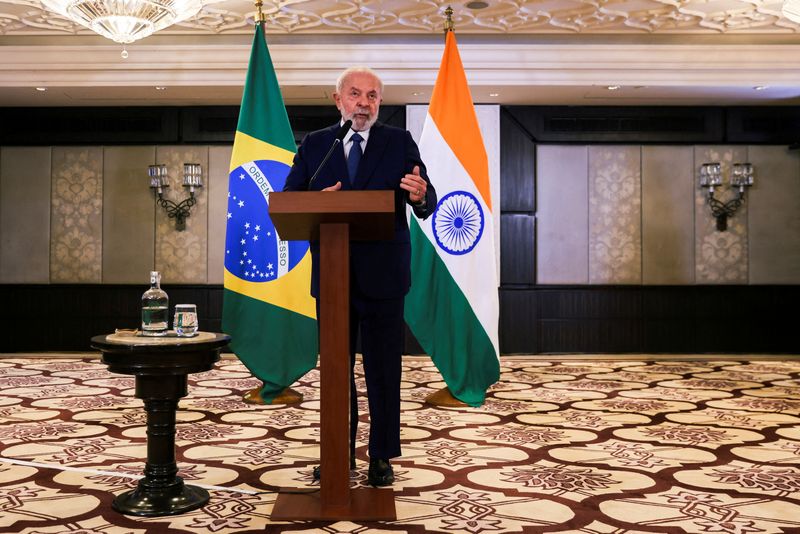By Anthony Boadle
BRASILIA (Reuters) – Since he returned to office in January, Brazil’s President Luiz Inacio Lula da Silva has traveled to 21 countries and met with more than 50 heads of state, including two kings and the Pope.
The globe-trotting leftist leader, the first head of state to address the United Nations General Assembly on Tuesday, has prioritized foreign trips in his third term so far, as he strives to restore his country as a global player.
“Brazil is back,” he repeats in speeches across five continents, in contrast with the growing isolation that came with his predecessor Jair Bolsonaro’s hard-right political stance and dismal environmental record.
But diplomats and foreign policy experts say Lula is far from restoring the “soft power” status Brazil enjoyed after his first two terms, from 2003 to 2010, when the country became a voice for the rising global south while remaining independent from both the U.S. and China.
In part, that reflects the choppier waters the 77-year-old Brazilian leader now navigates, as Beijing and Washington flirt with a new Cold War while war rages in Ukraine. Brazil has also become increasingly dependent on Asian markets, which buy half of its exports. China alone, Brazil’s main trading partner, buys 37% of its farm exports.
“This is a very tricky balancing act and Lula so far has not been able to find the right equilibrium,” said Oliver Stuenkel, an associate professor of international relations at the FGV think tank in Sao Paulo. “There is a perception in Brazilian society now that he is tilting towards the Sino-Russian axis more than the West.”
On Wednesday, Lula is scheduled to meet U.S. President Joe Biden to discuss the climate crisis on the sidelines of the U.N. General Assembly, focusing where the Brazilian leader has shined.
Lula has helped to restore Brazil’s central role in climate diplomacy, leading a regional rainforest summit, drawing global contributions to protect the Amazon and overhauling policies to bring down deforestation sharply.
Even before he took office, Lula was greeted like a rock star last November at the U.N. climate change conference in Egypt. His polices have helped to nearly halve deforestation of the Brazilian Amazon through August, compared to the first eight months of last year, rebuilding Brazil’s credibility for climate talks.
But his comments about the war in Ukraine – he has said both sides are responsible for the conflict as he sought to broker a peace deal – have angered U.S. and European allies, who have accused him of parroting Russian rhetoric.
Lula’s penchant for off-the cuff remarks have occasionally made matters worse.
During a G20 meeting in India this month, he said there was “no way” Russian President Vladimir Putin would be arrested if he attended next year’s summit in Rio de Janeiro. When reporters probed him on Brazil’s commitments to enforce an arrest warrant issued by the International Criminal Court, he rowed back his comments but suggested Brazil could leave the ICC.
“There have been some bruising moments. The whole Russia -Ukraine issue was a lesson learned,” said Thomas Shannon, a former U.S. ambassador to Brazil who is now senior international policy advisor at Arnold & Porter.
At last month’s BRICS summit in South Africa, where the group of leading emerging economies expanded its membership as China called for, Brazil got Chinese backing for a permanent U.N. Security Council seat it wants. But that is unlikely to happen any time soon, according to Shannon.
The closer ties to Beijing could complicate Brazil’s relationship with Washington, including access to key technology, Shannon added.
‘OUTDATED AGENDA’
Closer to home, Lula has reaped little in concrete terms from Latin America’s broad left-of-center alignment. The Mercosur trade bloc took nearly half a year to respond formally to a new European position on a trade deal now on the ropes.
And Lula’s longstanding sympathies with leftist governments in Nicaragua and Venezuela accused of human rights abuses have him looking out of step with a new generation of progressive Latin American leaders.
Lula rolled out the red carpet for Venezuelan President Nicolas Maduro in Brasilia at a regional summit in May, helping to bring the socialist leader out of isolation. Other leaders, including Chile’s leftist President Gabriel Boric, criticized Maduro’s presence.
Impressions of ideological bias may hurt Brazil’s image as the country returns to the international spotlight, putting Lula at odds sometimes with his Foreign Ministry, said Rubens Barbosa, a former Brazilian ambassador to London and Washington.
“Where is Brazil the defender of human rights? It’s not clear what Brazil stands for today when it picks Putin and Maduro as allies,” said a South American ambassador in Brasilia, who asked not to be identified.
“Brazil is rapidly wasting its soft power by trying to be an international player with an outdated agenda,” he said.
(Reporting by Anthony Boadle; Editing by Brad Haynes and Paul Simao)
